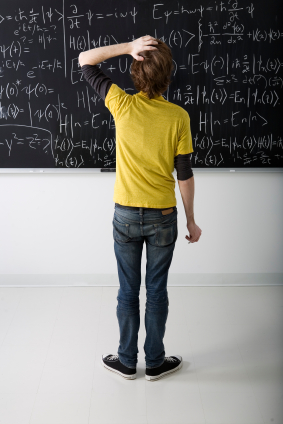A magazine where the digital world meets the real world.
On the web
- Home
- Browse by date
- Browse by topic
- Enter the maze
- Follow our blog
- Follow us on Twitter
- Resources for teachers
- Subscribe
In print
What is cs4fn?
- About us
- Contact us
- Partners
- Privacy and cookies
- Copyright and contributions
- Links to other fun sites
- Complete our questionnaire, give us feedback
Search:
Quantum computers and freaky physics (page two)
Vanishing trick

There’s just one snag to keep in mind. Remember when we said that looking at a particle makes it choose which state it’s definitely going to be in? That happens in quantum computing too, and it means that trying to get the answer to your cool thousand-particle calculation will cause all those carefully-tended states to disappear, except for one random one. Which puts you back where you started really. There may be ways to set your particles up beforehand to make sure the answer that’s left is the correct one, but researchers only know how to do that for a few problems.
How good are they?
So how much better would a quantum computer be than a regular one? They’re specialised beasts, that’s for sure. For a lot of types of calculation they actually aren’t that much more powerful than computers today. That problem of disappearing answers makes things tricky too. But there are some calculations that scientists know quantum computers will be super quick at, and get the right answer. One is finding the factors for large numbers, which would be pretty boring if it weren’t for the fact that online security, and thus every single online transaction from Amazon to the banking system, depends on not being able to find them. Quantum computing would mean that we’d have to start looking for new codes overnight. Another is that quantum computers will be able to simulate quantum physics, which at the moment is so difficult that people have won Nobel prizes for just making a bit of progress.
The big test
There’s one more, kind of weird, reason for research into quantum computers: if it turns out they’re not possible, then we know that something is really wrong with quantum theory. At the moment we base a lot of our ideas about how the universe works on quantum physics, but we’re not sure exactly how close the theory is to reality. If quantum computers don’t work we’ll know we should get on the hunt for a better model. That would be a tough pill for physicists to swallow, but exciting in a way too.
Small step or giant leap?
You might read lots of hype about quantum computing. How it’ll solve all of the toughest mathematical problems in a snap (like all the NP-complete problems), and outperform today’s supercomputers by a million times. That’s not really true. Quantum computers will be absolutely amazing for certain problems like factoring, but possibly only a few others, and likely not the NP-complete ones. There’s no reason to think that they’ll be a whole lot better than regular computers for lots of tasks. That could be disappointing, but at least now you know. Plus, if anyone starts going on at you about the quantum computing revolution, you can set them straight. Whether you choose to give them the eye roll-lip curl combination is completely up to you.
This article was based in large part on writings by Scott Aaronson of MIT.


